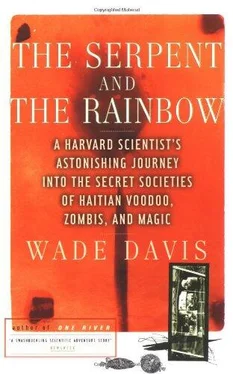Wade Davis - The Serpent and the Rainbow
Здесь есть возможность читать онлайн «Wade Davis - The Serpent and the Rainbow» весь текст электронной книги совершенно бесплатно (целиком полную версию без сокращений). В некоторых случаях можно слушать аудио, скачать через торрент в формате fb2 и присутствует краткое содержание. Год выпуска: 1985, Издательство: Simon & Schuster, Жанр: Старинная литература, на английском языке. Описание произведения, (предисловие) а так же отзывы посетителей доступны на портале библиотеки ЛибКат.
- Название:The Serpent and the Rainbow
- Автор:
- Издательство:Simon & Schuster
- Жанр:
- Год:1985
- ISBN:нет данных
- Рейтинг книги:5 / 5. Голосов: 1
-
Избранное:Добавить в избранное
- Отзывы:
-
Ваша оценка:
- 100
- 1
- 2
- 3
- 4
- 5
The Serpent and the Rainbow: краткое содержание, описание и аннотация
Предлагаем к чтению аннотацию, описание, краткое содержание или предисловие (зависит от того, что написал сам автор книги «The Serpent and the Rainbow»). Если вы не нашли необходимую информацию о книге — напишите в комментариях, мы постараемся отыскать её.
The Serpent and the Rainbow — читать онлайн бесплатно полную книгу (весь текст) целиком
Ниже представлен текст книги, разбитый по страницам. Система сохранения места последней прочитанной страницы, позволяет с удобством читать онлайн бесплатно книгу «The Serpent and the Rainbow», без необходимости каждый раз заново искать на чём Вы остановились. Поставьте закладку, и сможете в любой момент перейти на страницу, на которой закончили чтение.
Интервал:
Закладка:
Having bathed in the falls, I made my way to the mapou, and there among the buttresses and serpentine roots found shelter from the cold, damp wind. The roar of the water dominated all other sounds, but before long it fell away, leaving a welcome cushion of silence, the hollow tone one imagines deaf people hear all the time.
There were two snakes, I was warned, one green and one black, that lived at the base of the tree. If so, they left me alone. From the edge of a fitful sleep, I sensed only the thick hide of the mapou on either side of my face, and beneath my hands the texture of root bark. I knew every structure within that tree, each vessel, each pore and trichome, the placement of each stamen, and the pathways of every drop of green blood. In botanical studies I had watched it dissected into a thousand or more parts until each one lay isolated, a separate hypothetical event, simple enough to be explained according to the rules of my training. This was the legacy of my science. Each of us chipping away at the world, doing our bit. But what was I to make of Loco, the spirit of vegetation, the one that gives the healing power to leaves? This was his home, and it seemed to me strangely alive and different suddenly, not a series of components but a single living entity, animated by faith.
I caught a fingernail in the bark, and it sent chills up my back. I sat up abruptly. At my feet and all around the tree the pilgrims curled up like sheepdogs, their bones stiff and soaked in darkness. Around me in the crotch of other roots, I saw the faint glimmers of other penitents placing candles at altars that weren’t there when I lay down. Hands reached forward, pressing soft wax into a fissure in the smooth bark. The flames flickered and spat smoke and kept going out. Below us all, the sheer power of the falling water.
I woke twice more before dawn, first to a cobalt sky and moonbeams lapping the bushes, heavy with moisture. In the moonlight the roots of the mapou were white, motionless, and seemingly cold. By the next time the stars had faded and light cracked the horizon. Venus had moved all the way across the sky, and now it too dimmed. I followed it until my eyes ached. A gray cloud crossed over its path, and when it was gone so was the planet. I stared and stared until I couldn’t even see the sky. But it was hopeless. Venus was gone. It shouldn’t have been. Astronomers know the amount of light reflected by the planet, and we should be able to see it, even in broad daylight. Some Indians can. And but a few hundred years ago, sailors from our own civilization navigated by it, following its path as easily by day as they did by night. It is simply a skill that we have lost, and I have often wondered why.
Though we frequently speak of the potential of the brain, in practice our mental capacity seems to be limited. Every human mind has the same latent capabilities, but for reasons that have always intrigued anthropologists different peoples develop it in different ways, and the distinctions, in effect, amount to unconscious cultural choices. There is a small isolated group of seminomadic Indians in the northwest Amazon whose technology is so rudimentary that until quite recently they used stone axes. Yet these same people possess a knowledge of the tropical forest that puts almost any biologist to shame. As children they learn to recognize such complex phenomena as floral pollination and fruit dispersal, to understand and accurately predict animal behavior, to anticipate the fruiting cycles of hundreds of forest trees. As adults their awareness is refined to an uncanny degree; at forty paces, for example, their hunters can smell animal urine and distinguish on the basis of scent alone which out of dozens of possible species left it. Such sensitivity is not an innate attribute of these people, any more than technological prowess is something inevitably and uniquely ours. Both are consequences of adaptive choices that resulted in the development of highly specialized but different mental skills, at the obvious expense of others. Within a culture, change also means choice. In our society, for example, we now think nothing about driving at high speeds down expressways, a task that involves countless rapid, unconscious sensory responses and decisions which, to say the least, would have intimidated our great-grandfathers. Yet in acquiring such dexterity, we have forfeited other skills like the ability to see Venus, to smell animals, to hear the weather change.
Perhaps our biggest choice came four centuries ago when we began to breed scientists. This was not something our ancestors aimed for. It was a result of historical circumstances that produced a particular way of thinking that was not necessarily better than what had come before, only different. Every society, including our own, is moved by a fundamental quest for unity; a struggle to create order out of perceived disorder, integrity in the face of diversity, consistency in the face of anomaly. This vital urge to render coherent and intelligible models of the universe is at the root of all religion, philosophy, and, of course, science. What distinguishes scientific thinking from that of traditional and, as it often turns out, nonliterate cultures is the tendency of the latter to seek the shortest possible means to achieve total understanding of their world. The vodoun society, for example, spins a web of belief that is all-inclusive, that generates an illusion of total comprehension. No matter how an outsider might view it, for the individual member of that society the illusion holds, not because of coercive force, but simply because for him there is no other way. And what’s more, the belief system works; it gives meaning to the universe.
Scientific thinking is quite the opposite. We explicitly deny such comprehensive visions, and instead deliberately divide our world, our perceptions, and our confusion into however many particles are necessary to achieve understanding according to the rules of our logic. We set things apart from each other, and then what we cannot explain we dismiss with euphemisms. For example, we could ask why a tree fell over in a storm and killed a pedestrian. The scientist might suggest that the trunk was rotten and the velocity of the wind was higher than usual. But when pressed to explain why it happened at the instant when that individual passed, we would undoubtedly hear words such as chance, coincidence, and fate; terms which, in and of themselves, are quite meaningless but which conveniently leave the issue open. For the vodounist, each detail in that progression of events would have a total, immediate, and satisfactory explanation within the parameters of his belief system.
For us to doubt the conclusions of the vodounist is expected, but it is nevertheless presumptuous. For one, their system works, at least for them. What’s more, for most of us our basis for accepting the models and theories of our scientists is no more solid or objective than that of the vodounist who accepts the metaphysical theology of the houngan. Few laymen know or even care to know the principles that guide science; we accept the results on faith, and like the peasant we simply defer to the accredited experts of the tradition. Yet we scientists work under the constraints of our own illusions. We assume that somehow we shall be able to divide the universe into enough infinitesimally small pieces, that somehow even according to our own rules we shall be able to comprehend these, and critically we assume that these particles, though extracted from the whole, will render meaningful conclusions about the totality. Perhaps most dangerously, we assume that in doing this, in making this kind of choice, we sacrifice nothing. But we do. I can no longer see Venus.
It was a lovely morning. The summit of the waterfall caught the first light, and as the earth moved the tips of the forest trees at the base of the ravine turned to copper. Birds spun in waves across the valley; scents too, from stoked fires, even through the mist and growing sounds, herbs and sweet woods burning in the limpid light of dawn. On all sides, like flowers, the pilgrims broke from sleep to take small drops of the sun. From the shadows I too emerged, only into a peculiar and wonderful anonymity that I had not known in Haiti up to now. In part it was my own exhaustion, but mostly it was the power of the place and the sheer exuberance of the people; for once a solitary and bedraggled blanc was of little interest. Asking no questions, having no past, I simply wandered, a silent witness to a sacred event unlike anything I had ever known.
Читать дальшеИнтервал:
Закладка:
Похожие книги на «The Serpent and the Rainbow»
Представляем Вашему вниманию похожие книги на «The Serpent and the Rainbow» списком для выбора. Мы отобрали схожую по названию и смыслу литературу в надежде предоставить читателям больше вариантов отыскать новые, интересные, ещё непрочитанные произведения.
Обсуждение, отзывы о книге «The Serpent and the Rainbow» и просто собственные мнения читателей. Оставьте ваши комментарии, напишите, что Вы думаете о произведении, его смысле или главных героях. Укажите что конкретно понравилось, а что нет, и почему Вы так считаете.












